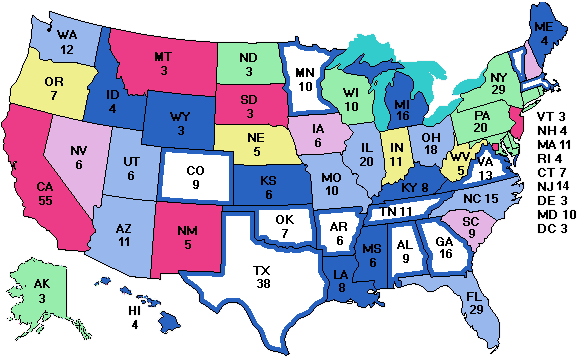News from the Votemaster
November Ranking of the Republican Candidates
It's time for our now-monthly ranking of the Republican presidential candidates. The biggest change from last month is the most dramatic fall for an overhyped candidate since former Tennessee senator Fred Thompson, who died yesterday, briefly ran in 2007. Jeb Bush would certainly have been a serious contender, but he has so many flaws as a candidate that he shot himself in both feet—with a shotgun. At this point Sen. Marco Rubio (R-FL) and Sen Ted Cruz (R-TX) look like the best shots. However, keep in mind that when the outside candidates fade or quit in disgust for some reason, those votes have to go somewhere. Donald Trump's base is blue-collar workers. Ben Carson's is evangelicals. Carly Fiorina's is people who hold business executives in high regard. These are not compatible groups and if one of them exits the race, the votes may splinter among multiple candidates.
That said, Sen. Marco Rubio is probably the only remaining candidate who could unify the establishment, tea party, and evangelical wings of the Republican Party. Sen. Ted Cruz is loved by tea partiers and popular with evangelicals, but barely tolerated by the establishment. Could Donald Trump actually get the nomination? Not if RNC chairman Reince Priebus has anything to do with it, but maybe he won't. A Trump nomination, completely and totally inconceivable 3 months ago, has been upgraded to very unlikely. (V)
| Candidate | Advantages in Primaries | Disadvantages in Primaries |
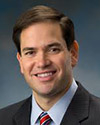 Marco Rubio |
|
|
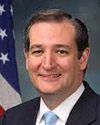 Ted Cruz |
|
|
 Donald Trump |
|
|
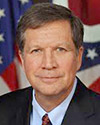 John Kasich |
|
|
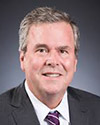 Jeb Bush |
|
|
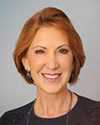 Carly Fiorina |
|
|
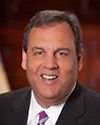 Chris Christie |
|
|
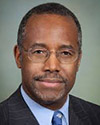 Ben Carson |
|
|
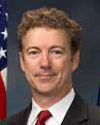 Rand Paul |
|
|
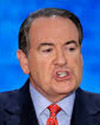 Mike Huckabee |
|
|
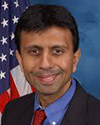 Bobby Jindal |
|
|
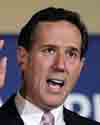 Rick Santorum |
|
|
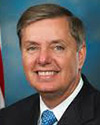 Lindsey Graham |
|
|
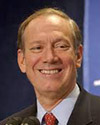 George Pataki |
|
|
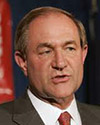 Jim Gilmore |
|
|
Rubio and Cruz: the Finalists?
Sen. Ted Cruz is privately telling colleagues that he believes the race will ultimately come down to him and Sen. Marco Rubio. With Jeb Bush in deep doo-doo and the other senators and governors in low single digits, when the outsiders fade, Cruz' belief may well become reality. Although both are 44-year-old freshman senators, they differ on a number of policy issues that could ultimately determine who comes on top.
Both were tea party heroes when they were elected, but Rubio has become more mainstream during his time in the Senate. Cruz has not. For example, Rubio supported giving President Obama fast-track authority to push the Trans-Pacific Partnership deal. Cruz voted against it, along with Sen. Bernie Sanders (I-VT). Cruz is eager to shut down the government any time he can't get his way. Rubio is far more hesitant. Rubio appears trying to become the mainstream favorite whereas Cruz wants to ride the tea party horse all the way to the Republican National Convention.
Whether it is Rubio and Cruz or some other duo as the finalists, the Republican elite is getting antsy. Tomorrow marks the halfway point between the first Republican debate and the Iowa caucuses. Or as the late Yogi Berra might have put it: "It's getting late early." What the establishment wants more than a specific candidate is clarity and we don't have that at all. The outsiders are still polling at more than 50% and although the insiders don't believe any of them will last, they really don't know where those votes will go when they collapse. Combined with the increasing likelihood that on March 2, Hillary Clinton will wake up to headlines about "presumptive Democratic nominee Hillary Clinton," not having a standard bearer to fight her is worrisome. The problem is that the field is not coalescing yet and may not for a while.
Bernie Sanders Runs His First Ad
Bernie Sanders raised $26 million in the past quarter, almost matching Hillary Clinton's $28 million. Now he is starting to spend it. He is launching his first ad campaign, with a buy of $2 million for television time in Iowa and New Hampshire. The ad starts by pointing out that he is the son of Polish immigrants who grew up in a Brooklyn tenement and went to a public high school and then college. It is completely positive, highlighting his career and the things he has believed since he got started in politics, as mayor of Burlington, VT. It says he has been fighting injustice and inequality, speaking truth to power, fighting for working families, and pushing for free tuition at public colleges. It also mentions some of the things he has opposed, including the Iraq War, Wall Street, and a corrupt political system. The only time his voice is heard he is at a big rally saying: "People are sick and tired of establishment politics and they want real change." Nowhere in the ad is Hillary Clinton mentioned, nor are the Republicans. (V)
Trump's Supporters Feel America Has Lost Its Greatness
One thing that unifies most of Donald Trump's supporters is that they feel that America used to be "great" but isn't any more. The only problem is that they differ on when it was great and what happened. His supporters are older and whiter than the country as a whole and many look back to Ronald Reagan's administration to a time when the country was great. One supporter interviewed by the Washington Post went back even further and said: "The last time we had good jobs and respect for the military and law enforcement was, oh, probably during Eisenhower." Another thought his plain talk could get things done. Others name other times and issues but all of them have a free floating sense of anxiety. For blue-collar workers with only a high school education, a key issue is jobs and wages and a feeling that immigrants are taking away American jobs.
Historically, a sense that the country is in decline is not new. During the depression, many people felt that things would never get better. After the 1957 launch of Sputnik, many Americans felt the Russians were way ahead of us. Then it was the Japanese who were better at everything, and now it is the Chinese. People are concerned that the government doesn't seem to work any more but don't realize why that is (because the country is very evenly divided between Democrats and Republicans and they want to move in opposite directions). Consequently, Trump's simplistic slogans appeal to many people who see the country as in decline. (V)
How Mysterious Is the Carson Mystery?
There have been a great many words written trying to make sense of Ben Carson's rise to the top of the polls. Among the latest is a hagiographic piece produced for CNN by GOP operative Alex Castellanos. The heart of Castellanos' assessment:
In relief comes Dr. Ben Carson, whose life is a testament to humility and selfless service. He is the very opposite of the vainglorious politician whose re-election is his only accomplishment. Unlike a Donald Trump, his success comes from serving others, not from taking from them.
It is hard to image that Castellanos could have written this with a straight face. First of all, putting one's self forward as a candidate for president is hardly an act of humility—whether we are speaking of Donald Trump or Sen. Bernie Sanders, believing that you are qualified to be leader of the free world implies a certain amount of arrogance. Further, it is true that Ben Carson was a physician. However, he went into the highest-paid medical specialty, served on corporate boards, gave paid speeches, and was willing to endorse pseudo-scientific products. He has amassed a fortune in excess of $10 million, which is certainly a testament to hard work and discipline, but not so much to selflessness.
Most egregious, however, is Castellanos' falling victim to a version of the correlation equals causation fallacy. He observes that the most unusual thing about Carson (perhaps) is his low-key personality, then notes that Carson is leading the polls, and assumes the latter must be the result of the former. The problem is that this thesis does not stand up to scrutiny. Carson's personality is unchanged since the beginning of the campaign season. However, he did not begin to rise in the polls until mid-September, and he did not begin to assume frontrunner (or near-frontrunner) status until mid-October. This rise correlates poorly with the debates (he remained around 9% well after the first debate, on August 6), which gave voters abundant exposure to his personality. However, it tracks very well with what appears to be a conscious decision to begin saying provocative things: No Muslim presidents (Sep. 27), if the Jews had been armed there would be no Holocaust (Oct. 8), Obamacare = Slavery (Oct. 10), campus speech should be monitored (Oct. 20), abortion = slavery (Oct. 25), etc. These are not the first occasions on which Carson has been provocative (for example, he said being in prison makes people gay way back in March), but the past occasions did not come in such rapid sequence.
To the extent that Carson's personality matters, it is because it makes the things he says appear to be polite (rather than, say, bombastic—which is what it seems like when Donald Trump says things). Further, because he is a doctor, it makes the things he says appear to be legitimate. And because he is black, as Salon observes, it makes the things he says appear to be non-racist. As a consequence of these factors, he can get away with saying things that the base wants to hear, but that would be considered offensive coming from other candidates (Jeb Bush certainly can't compare things to slavery). Carson can also get away with telling half-truths and baldfaced lies more easily than other candidates. Politifact has evaluated sixteen different statements made by Carson during the campaign, and has yet to rate one true or mostly true (he gets 3 half trues, 4 mostly falses, 7 falses, and 2 pants on fires.) By contrast, Donald Trump has issued forth with zero trues, but 5 mostly trues and 10 half trues; Hillary Clinton has 26/29/39, Sen. Marco Rubio has 23/27/17, and Jeb Bush has 14/16/14.
In short, Ben Carson is selling a bill of goods, just like Donald Trump is. He's just doing a better job of it at the moment. Voters are historically willing to indulge such fantasies in primary season, but eventually the time comes to pull the lever, push the card, or mark the box, and fantasy is replaced by reality. Very likely, long before that moment arrives, Carson will have already started his new job at Fox News. (Z)
Obama Will Leave $20 Trillion in Debt Behind
With a budget deal in place that will keep the government operating until Barack Obama's term is over, it is possible to project the approximate total growth of the federal debt under the 44th president. On the date of his first inauguration, the total stood at $10.6 trillion and upon his departure it will be at about $19.8 trillion. This enormous figure will be a major talking point in 2016, particularly at debate time. Indeed, conservative media are already crowing about the debt "doubling" and are calling Obama the $20 trillion man.
Not so fast, says the Washington Post: The national debt is a complicated subject, and its growth can be viewed in many different ways. As a total number, $20 trillion is disheartening (they don't call economics the "dismal science" for nothing). Similarly, Obama does not do well if weighing the debt relative to GDP (60% of GDP when he started, 100% when he leaves). On the other hand, much of the deficit spending took place in the early part of Obama's first term, which means some of the blame belongs to George W. Bush. Further, if we consider the percentage change in the debt, Obama will finish slightly better than Bush and far better than conservative icon Ronald Reagan (a staggering +180%). By another measure, as the blog CalculatedRISK observes, Obama is doing quite well indeed: His second term will see more jobs added than any of the three Bush terms, and roughly as many as Ronald Reagan's first term (the champion on this front is Bill Clinton, whose two terms were the two best, by this measure, in American history).
The point is that it is easy enough to look at Barack Obama's presidency—and, indeed, any presidency—through an optimistic prism or a pessimistic prism. Which is why it is always wise, in campaign season, to keep Mark Twain's warning in mind: "There are three kinds of lies: lies, damned lies, and statistics." (Z)
Is Glenn Beckoning?
As the RNC and its candidates explore options for future debates, given their unhappiness with the "mainstream media," The Blaze reports that the GOP is considering an alternative option as moderator: Glenn Beck, who just so happens to own The Blaze.
Handing a debate over to Beck seems...unlikely. He claims that he is no longer a Republican, which may be true, but in most voters' minds he's still lumped in with Rush Limbaugh, Sean Hannity, Laura Ingraham, and the rest of the conservative commentariat. If he spends the night lobbing softballs at the candidates, it will look like the RNC replaced NBC News with a shill. At that point, they might just as well get Reince Priebus himself, or Mitt Romney, or Rick Perry to ask the questions. Even worse, however, would be if Glenn Beck wanted to show his viewers that he really is an independent and that he's not afraid to lock horns with anyone. He's not a journalist, and has no pretension of fairness, and so could ask some really nasty stuff. If he did, the participants would hardly be able to deflect the questions and blame them on the liberal media. As such, the RNC will presumably respond to Beck's offer with a firm, "Thanks, but no thanks." (Z)
Email a link to a friend or share:---The Votemaster
Nov01 Bernie Sanders is in Trouble
Nov01 Gun Control Likely to Be a Talking Point in 2016
Nov01 Can the GOP Debates Be Fixed?
Nov01 The Jeb! Action Plan
Nov01 Rubio Gets Big Endorsement
Nov01 Rand Paul's Halloween Party
Oct31 Bill de Blasio Endorses Hillary Clinton
Oct31 Candidates Plan to Talk About Future Debates But without the RNC
Oct31 Priebus Tries to Reassert Control of Debates
Oct31 Marco Rubio's Background is Not What He Makes It Out To Be
Oct31 Carson's Past Support of Gay Rights May Hurt Him Now
Oct31 Sanchez May Need GOP Help in Senate Primary
Oct31 Sen. Vitter Trails Democrat by Double Digits in Gubernatorial Race
Oct30 Bush Supporters Struggling to Pick Up the Pieces
Oct30 CNBC Was the Biggest Loser Wednesday
Oct30 Truth Was Another Loser at GOP Debate
Oct30 Bush and Rubio Are Now on a Collision Course
Oct30 For All His Strengths, Rubio also Has Serious Weaknesses
Oct30 Reid Calls on Rubio to Resign from the Senate
Oct30 Rubio and Cruz Each Raise A Million Dollars Since Debate
Oct29 Rubio and Cruz Shine at Chaotic Debate
Oct29 Could Bush Come Back Like McCain Did in 2008?
Oct29 Rafael Cruz is Too Busy To Campaign in Iowa So He Sent Rafael Cruz There
Oct29 Could a Cruz Nomination End the Gridlock?
Oct29 Florida Newspaper to Rubio: Resign
Oct28 Tonight's Debate is Number Three for the GOP
Oct28 Carson Passes Trump Nationally
Oct28 Trump Plays the Faith Card
Oct28 On Taxes, Republicans Go for Puppies and Rainbows
Oct28 Mark Kirk Is the Most Endangered Republican in the Country
Oct28 Could Hillary Clinton Really Be Beating Bernie Sanders by 41 Points in Iowa?
Oct28 Could It Be Cuban vs. Cuban in the End?
Oct27 Boehner Negotiates Stealth Budget Deal
Oct27 Carson Has Double-digit Lead in Iowa
Oct27 Republicans Are In Denial about Hillary Clinton's Chances
Oct27 Cruz Working on Texas
Oct27 Jeb Loads the Last Bullet into the Chamber
Oct27 Sharron Angle Might Run for the Senate Again in Nevada
Oct27 Hispanic Voters Don't Like Republicans
Oct27 Marco Rubio Doesn't Like the Senate
Oct26 Republican Voters See Trump as Strongest General Election Candidate
Oct26 Clinton Would Love to Face Trump
Oct26 Rubio Attacks Trump's Immigration Plan
Oct26 Carson Against Abortion Under All Circumstances
Oct26 Ross Douthat Meekly Predicts Rubio Will be the Republican Nominee
Oct26 Sanders Drawing Sharp Contrasts with Clinton
Oct26 No Smooth Sailing for Obamacare Repeal
Oct26 Fundraising Looks to Be No Problem for Ryan
Oct26 Republicans Facing a Tech Gap?

 February
February  March 1 (Super Tues)
March 1 (Super Tues)  March 2-14
March 2-14  March 15-31
March 15-31  April
April  May
May  June
June 